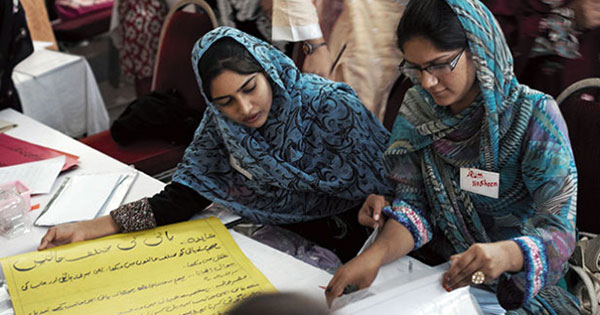Article appeared in Devex on 9 June 2015.
Want to work in #globaldev? Go local and learn how to communicate
By Richard Jones

Skills related to knowledge sharing, enabling dialogue and understanding complex relationships will be much more in demand as the global development industry evolves, two think tank representatives have told Devex.
The future of the industry is uncertain for job seekers who will need to adapt to a post-2015 agenda that could be very different from development work today. So what skills should an aspiring development professional start acquiring now to position themselves for success later?
Devex asked two forward-thinking practitioners: James Mackie, a senior European Union development policy analyst at the Maastricht-based European Center for Development Policy Management, and Debapriya Bhattacharya, chair of Southern Voice on Post-MDG International Development Goals, a think tank network.
The emphasis will likely be more on knowledge rather than money, according to Mackie, who explained that sharing knowledge will help future development practitioners learn more about running the systems that work in one country — and whether they can work in another — instead of just implementing the same types of projects over and over again because they have worked in the past.
Within 10, 20 or 30 years, Bhattacharya said he expects many low-income countries to become less reliant on donor funds, although they will still need the development industry to provide them technical assistance in a wide range of areas.
Read more from Mackie and Bhattacharya:
● Private sector concessional loans as ODA — why not?
● ‘Unambitious’ EU outcomes put Addis prospects in jeopardy
“The development industry, being exclusively dependent on aid-related issues, has to broaden its portfolio and the instruments they are going to deal with,” he noted. “So I would foresee a transformation of the development community, to go beyond aid, and look particularly at issues not only in terms of how the aid relationship affects the national economy, but also how the new development relationships and cooperation affects intracountry relationships.”
Bhattacharya mentioned, for instance, how the sustainable development goals will be truly universal in the sense that they will tackle inequality not only within countries, but also among countries, which in turn will require a change in mindset for the development community and development professionals alike.
“The paradigm is shifting,” he said. “The issue is whether we will all be on the boat — or whether it will move without you.”
This means future development practitioners will need a much better understanding of what happens on the ground, Mackie pointed out, so skills related to knowledge, dialogue and facilitation will be much more in demand “rather than the nuts and bolts of, for instance, putting up tents in an emergency operation.”
And as more of the decision-making process moves to regional headquarters, Mackie said foreign expertise will only play an important role in large-scale emergencies such as the recent earthquake in Nepal.
With this scenario in mind, Bhattacharya advised aspiring development practitioners to learn how to communicate and connect national with global practices, and vice versa, as the two-way street the industry once was is fast turning into an intricate highway.
“It is about communication and gaining a better understanding about the new realities,” he explained.
Bhattacharya recommended those aiming to work in development “concentrate on understanding the relationships” between all stakeholders, and constantly invest in keeping that knowledge up to date, as well as learning how to use social media and ICT.
“You know, nowadays, even if you don’t have a bank in a remote area in Bangladesh or in Kenya, money can still reach you within 24 hours through mobile banking,” he said. “Those types of transformations make me feel very optimistic about the future.”
Whether you’re a seasoned expert or budding development professional — check out more news, analysis and advice online to guide your career and professional development, and subscribe to Doing Good to receive top international development career and recruitment news every week.

